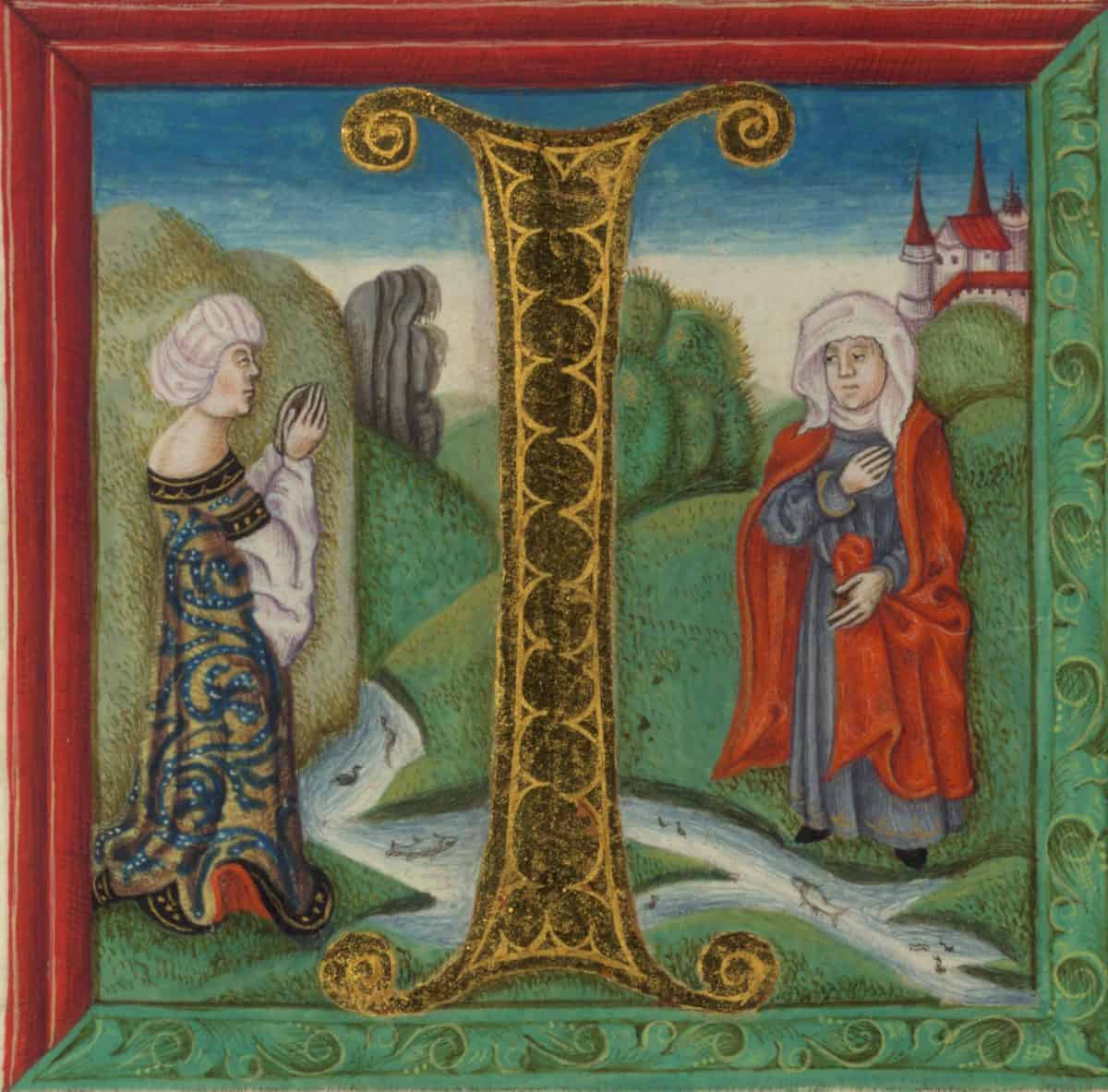We can see from the definition below that respect means to hold someone or something in high regard. The Bible tells us quite a bit about how God feels about respect. One of the most well-known verses about respect is the one that tells us to honor our mothers and fathers. At the same time, there are many others that tell us the true heart of God and how he feels about respect. While it is not always easy, he expects us to extend respect to everyone, from authority in government and our homes to the neighbor on the street. These Bible stories about respect for kids can help you explain what respect is and how it can be seen in a number of situations.
According to the Merriam-Webster dictionary, respect is defined in a few different ways:
- “A relation or reference to a particular thing or situation.”
- “An act of giving particular attention: consideration.”
- “High or special regard: esteem.”
- “To consider worthy of high regard.”
What Does the Bible Say About Respect?

©Yuri A / Shutterstock.com
Before taking a look at these Bible stories about respect, let’s look at individual verses that cover the topic.
- “So in everything, do to others what you would have them do to you, for this sums up the Law and the Prophets.” (Matthew 7:12)
- “Do nothing out of selfish ambition or vain conceit. Rather, in humility, value others above yourselves.” (Philippians 2: 3)
- “A new command I give you: Love one another. As I have loved you, so you must love one another.” (John 13:34)
- “Let everyone be subject to the governing authorities, for there is no authority except that which God has established. The authorities that exist have been established by God.” Romans 13:1
- “Children, obey your parents in the Lord, for this is right. Honor your father and mother- which is the first commandment with a promise- so that it may go well with you and that you may enjoy long life on the earth.” (Ephesians 6:1-2)
- “Fathers, do not exasperate your children; instead, bring them up in the training and instruction of the Lord.” (Ephesians 6:4)
Within these verses, we can see that God has a great deal to say about respect. Loving and respecting those we don’t necessarily like can be difficult. Respect doesn’t mean that you necessarily agree with the person. It means you show them honor and regard. It means that you understand that they too are a human being, that is deserving of dignity. In each of these Bible stories, respect is displayed in a number of different ways and God’s heart for respect can also be seen.
Honoring Your Parents

©Photoroyalty/Shutterstock.com
Honoring your parents is probably one of the better-known bible verses about respect and one that parents everywhere love. This command is found in many places within the Bible, including in Ephesians 6:1-3.
“Children, obey your parents in the Lord, for this is right. Honor your father and mother- which is the first commandment with a promise- so that it may go well with you and that you may enjoy long life on the earth.” (Ephesians 6:1-2)
“Listen to your father who gave you life, and do not despise your mother when she is old.” (Proverbs 23:22)
Honoring your mother and father is even in the Ten Commandments. However, this command goes deeper and further than “obeying” your parents no matter what they say. Honoring doesn’t mean blind obedience. It means to show them respect in your interactions with them. How you treat your parents every day, even as you grow into an adult.
Honoring Your Children

©fizkes/Shutterstock.com
On the flipside, if you continue reading Ephesians 6 you can see that parents are also commanded not to “exasperate” their children. The exasperate definition means to “provoke to anger.” It simply means respect should be a two-way street in the household. Children respecting their parents by honoring them and parents respecting their children by refraining from “provoking them to anger.”
Have you ever heard the term “don’t poke the bear?” This verse is basically saying, yes, children should honor their parents, but parents need to also respect their children by not purposefully trying to anger them. This can be done a number of ways. Setting high expectations, berating or belittling them, and basically not showing the same respect that they are expected to show their parents.
Respect for Authority

©ESB Professional/Shutterstock.com
In Matthew 22 Jesus is asked about paying taxes to Caesar. This question was formed as a way to trip him up and lead Jesus into a trap. However, Jesus responds by saying “Render unto Caesar the things that are Caesar’s and unto God the things that are God’s.”
Additionally, there are several instances in the Bible that show how God feels about respecting authority. In Romans, Paul tells the church that all authority comes from God and that this governing authority needs to be respected. Furthermore, Hebrews states that Christians need to obey leaders and not groan about it.
So, what does this mean exactly? Respect for authority can range from parents to those in government. It doesn’t necessarily mean you agree with every little thing. However, it means that you will respect their authority as long as it doesn’t overstep what God commands of us. We see this when Jesus tells them to pay taxes to Caesar and to give to God what is God’s.
Daniel in the Lion’s Den

©dangdumrong/Shutterstock.com
In the previous slide, we see how God commands us to respect authority. However, if authority is going against what God says, then it is okay to no longer respect authority. This can be seen in the story of Daniel in the Lion’s Den.
Daniel was one of the King’s right-hand men. He was respected by the King as well. However, the other satraps did not like Daniel and longed to see him convicted of a crime. (Their hatred was that strong.) Yet, Daniel was a good man, who respected authority, and didn’t disobey any laws. They knew the only way to trap Daniel was to create a law that meant he disobeyed God’s law.
Daniel in the Lion’s Den

©iStock.com/Anca_Liliana
The other satraps went to the King and got him to sign off on a law that stated no one was allowed to pray to anything or anyone except the King for 30 days. Anyone who disobeyed this law would be punished.
Daniel knew this was one law he could not abide by. It meant disrespecting his own God. So, Daniel continued to show God respect by praying to him openly, even though it meant going against the King. Daniel was thrown into the lion’s den with the intention of him being devoured by the hungry lions. However, God protected Daniel while he was down there because of his respect and reverence for God and his laws.
Elisha is Mocked

©shironosov / iStock via Getty Images
For being a short story found in 2 Kings, this one is quite gruesome. It may not be suitable for younger children. However, there’s something to be said about mocking another person. In this short passage, we see Elisha walking along his way to Bethel. He’s doing absolutely nothing but minding his own business. This is when a group of boys up to no good come out of the woodwork.
They begin making fun of Elisha. Why? Because he was bald. They tell him to go away and continue to mock his bald head. Well, because of the mockery, God sends two bears out of the woods, and these bears attack and kill these boys.
Gruesome as it is, we can see plainly how God feels about mocking another person in this Bible story.
Nehemiah Respects Authority

©tomertu/Shutterstock.com
Nehemiah who was a cupbearer to King Artaxerxes became aware of the wall being destroyed in Jerusalem. The Israelites were his ancestors, and Nehemiah had a desire to go back to Jerusalem to rebuild the wall.
He couldn’t just leave his position as a cupbearer though. Nehemiah had to ask for permission from the King. He was terrified of course but he did so in a respectful manner. The King grants Nehemiah permission. So, he went on to rebuild the walls of Jerusalem and helped bring the people of Israel back to worshipping God.
The Prodigal Son

©sebra/Shutterstock.com
In the parable of the prodigal son, we see love, respect, forgiveness, and more. In this Bible story, there is a man who has two sons. One of the sons demands that his father give all of his inheritance to him. When the father does, the son runs off and blows through all the money.
We don’t know everything that he did, but we do know that eventually, he ran out of money. He finds himself in the pig pens, desiring to eat the same slop as them. At his very lowest, the son feels remorse for his actions and realizes that his father’s servants eat better than him. He makes up his mind to return to his father’s house and beg forgiveness.
Upon his return, the father rejoices and decides to throw a huge feast for his son. The father then runs down to greet his son and forgives him right away.
The Prodigal Son

©fizkes/Shutterstock.com
We see love on full display in this story. The father’s love for his returning son is the most obvious point of this story. However, if you look deeper, you can also see respect. The father’s respect for his son. He doesn’t lecture him, yell at him, or make him feel terrible for his mistakes. Instead, the father shows the son respect by welcoming him back home, honoring him with a feast, and remembering that he is simply a human being.
The returning son shows respect to his father by asking forgiveness. Then, further in the story we get to see the true feelings of the oldest son. He is very upset because of his brother’s return. We see him disrespecting his father by complaining about the decisions he made to throw a feast, and whining that he does everything right, where is his feast?
Adam and Eve

©PeopleImages.com - Yuri A/Shutterstock.com
In the story of the first humans, Adam and Eve, it’s possible to see both respect and disrespect on full display. When God created them, he told Adam and Eve that they had full reign of everything in the garden, except they weren’t allowed to eat from the Tree of Knowledge of Good and Evil.
For a time, the two respected God’s rule. However, a serpent comes and tricks them into questioning God’s authority. Will you truly die? He asks. Once Adam and Even begin to question God, it’s easy to see disrespect come in. They make the decision to disobey God and realize immediately that they are naked.
Filled with shame and embarrassment, the two hide from God when he asks where they are. God knew what had happened, so he made them clothes out of animal skin. Here, we can see that although God was disappointed with their disobedience and that there were consequences, he still respected them enough to create something that would cover their nakedness.
Ruth and Naomi

©"Illuminated Manuscript, Bible (part), Naomi and Ruth, Walters Manuscript W.805, fol. 155v - 7351796512" by Walters Art Museum Illuminated Manuscripts is licensed under CC0 1.0. - Original / License
The story of Ruth and Naomi has quite a few takeaways. You see love, kindness, and hope. Additionally, within this Bible story, there is respect.
Ruth is the daughter in law of Naomi. Both of them lose their husbands, along with Ruth’s sister-in-law. Naomi tells her daughter in laws to go back to their mother’s, since they are young, hopefully they will be able to find another husband.
However, during this time, most women relied on their husbands or families for security. This meant that Naomi was going to go back to her homeland. While one of her daughters in laws follow her instructions to go back to their mother, Ruth refuses. She tells Naomi that wherever Naomi goes, she will go.
Ruth and Naomi

©Mir141/Shutterstock.com
Ruth shows Naomi immense respect by staying with her mother-in-law even though she doesn’t have to. Undoubtedly, Ruth knew it might be a harder choice, yet she stuck by her. For this choice, God blesses Ruth when she goes to collect barley from a field. She meets Boaz (a relative of Naomi’s late husband.) He helps her collect food for her and Naomi. Eventually, the two are married, and with the marriage comes financial and social security for both Naomi and Ruth.
One Last Note

©fizkes/Shutterstock.com
Respect can be seen in several Bible stories, from how God desires families to respect one another to sticking close to those we love. Furthermore, respect goes much deeper than blind obedience or love. Respect is regarding someone as having worth and giving it to them. We can show respect to those around us, even if we disagree with them about things. We do this by respecting authority, not degrading or mocking another person, and simply showing love to others.
The image featured at the top of this post is ©Fabrik Bilder/Shutterstock.com.
